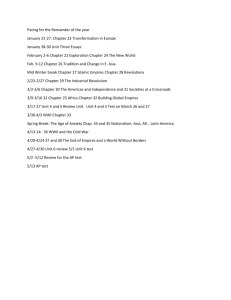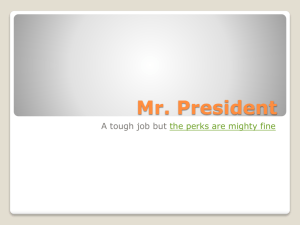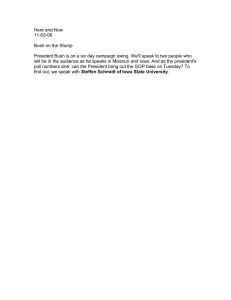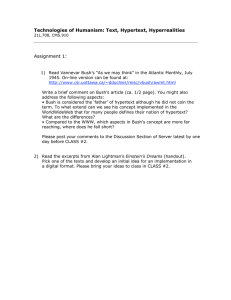What is an International System? Which countries have power & control?
advertisement
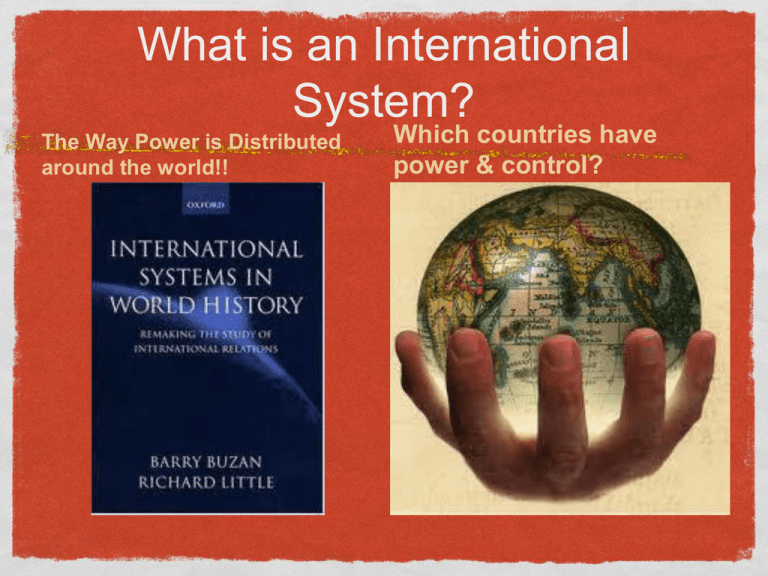
What is an International System? The Way Power is Distributed around the world!! Which countries have power & control? There have been four IR Systems during the 20th Century? What are the name of the four systems? Which countries had the power in each system? Pre- World War I System European Imperialism- Dominance of Power by the European Empires until 1914. Balance of Power System- The Europeans will share power and avoid fighting wars against each other for power! European Colonies in the World! Great Britain was the most powerful of all the European Empires. This system comes to and end as the Europeans go to war with each other during WWI & WWII! 2nd System is the destruction of Balance of Power System- End of European Countries as world powers ! It is a time of an unstable world, and European Empires destroy each other and decrease their power in the world. WWI- European Empires fight each other! WWII- European Empires continue to destroy each other! The 3rd IR System the Cold War System. After WWII, the United States and the Soviet Union are the two hero’s of the war and are the two most powerful countries in the World! This Bi-polar world remains until 1990 & the collapse of the Soviet Union! We will focus on the Cold War & U.S. Foreign Policy throughout the semester! 1945-1990- Cold War System, Bi- Polar System. The Fourth System is just beginning…. The Collapse of the Soviet Union leaves only one “super power” in the world- the United States. Will it remain a Unipolar world, Bi Polar or Multipolar world? Multipolar BRIC Countries & European Union Arab League How countries relate to each other (foreign policy), within an International System, is the Study of International Relations How did countries interact with each other during the Cold War or Present IR System? What were the Foreign polices during these systems? Which countries were friends? Which countries were our enemy? Which countries went to war with each other? Why did they go to war? Countries relate to each other based on their Nation’s Interests!! What is foreign policy? • The way a country deals with the outside world! • Type of Power, diplomatic, economic, or military power! Trade agreements use of economic power! • NAFTA International Treaties use of diplomatic power! Wars & Conflicts use of military power? Tsunami relief pledges near $4 billion Economic Power Economic Sanctions use of economic power. WHAT IS FOREIGN POLICY BASED ON? A COUNTRIES NATIONAL INTERESTS. The national interest, (English: reason of the State), is a country’s goals and ambitions whether economic, military, or cultural. U.S. NATIONAL INTERESTS • Ensure U.S. allies survival • Prevent attack on U.S.- nuclear or any attack • Energy Policy- ensure the viability & stability of global systems (supply of energy) • Rebuild U.S. & Muslim Relations • Establish productive relations, with China & Russia. President Bush did NOT give up his sovereignty to invade Iraq! Sovereignty-Supreme Power or Authority Surpranational-UN did NOT support Iraq War! Which branches create Foreign Policy & National Interests? And the Cabinet!!! President picks cabinet members. Senate approves appointments. • Cabinet of President George Washington , 1793 (Term 1) State Thomas Jefferson Treasury Alexander Hamilton War Henry Knox Attorney General Edmund Jennings Randolph Foreign Policy Departments • Who is the present Secretary of State? Defense? • Treasury Department • Who is present Attorney General? Newest Department! • Who is the director of Homeland Security? • Who is the National Security Council/Advisor? • Who is the director of the CIA? • Who is the U.S. Ambassador to the United Nations? President George W. Bush What major Foreign Policies and events occurred during President Bush ‘s terms in office? Who were his cabinet secretaries and advisors? Bush Doctrine? 9/11 Attacks Invasion of Iraq & Afghanistan… President Barak Hussein Obama What major Foreign Policies and events occurred during President Obama’s terms in office? Who were/are his cabinet secretaries and advisors? The Bush Doctrine? Preemptive Military Action. U.S. will act alone when necessary… Unilaterally Which country did the President Bush implement his preemptive security strategy?
